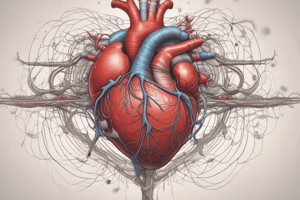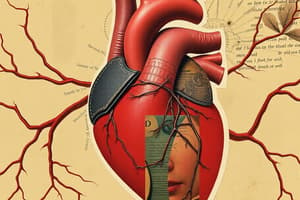Podcast
Questions and Answers
Which type of blood vessels carry oxygen-rich blood away from the heart?
Which type of blood vessels carry oxygen-rich blood away from the heart?
- Arteries (correct)
- Capillaries
- Venules
- Veins
What is the function of capillaries in the cardiovascular system?
What is the function of capillaries in the cardiovascular system?
- Thick-walled blood vessels
- Expandable blood vessels
- Facilitate the exchange of nutrients and waste products (correct)
- Carry blood back to the heart
Which circulation loop transports blood between the heart and lungs?
Which circulation loop transports blood between the heart and lungs?
- Pulmonary circulation (correct)
- Coronary circulation
- Systemic circulation
- Pulmonary artery circulation
What is the main function of the heart in the cardiovascular system?
What is the main function of the heart in the cardiovascular system?
What is the function of the left side of the heart?
What is the function of the left side of the heart?
Which type of blood vessel is thinner-walled and has narrower lumens?
Which type of blood vessel is thinner-walled and has narrower lumens?
Which of the following is not a risk factor for circulatory diseases?
Which of the following is not a risk factor for circulatory diseases?
What can impair the heart's ability to pump blood effectively?
What can impair the heart's ability to pump blood effectively?
What do statins help in preventing when it comes to circulatory diseases?
What do statins help in preventing when it comes to circulatory diseases?
Why is understanding the cardiovascular system crucial in maintaining health?
Why is understanding the cardiovascular system crucial in maintaining health?
Flashcards are hidden until you start studying
Study Notes
Unlocking Body Circulation: Discovering Blood Circulation, the Cardiovascular System, Heart Function, and Circulatory Diseases
Imagine a complex, interconnected highway system, transporting vital resources throughout the body. This highway system is the heart of our existence: the cardiovascular system and its life-sustaining process called blood circulation. In this article, we'll explore the intricacies of this system, from the pumping heart and the veins and arteries that carry blood, to the diseases that can disrupt this vital flow.
Blood Circulation
Blood circulates through the body in a continuous loop, oxygenating tissues and organs while removing waste products. Blood circulation involves two interconnected loops: the pulmonary circulation, which transports blood between the heart and lungs, and the systemic circulation, which carries blood between the heart and the rest of the body.
The Cardiovascular System
The cardiovascular system consists of the heart and the blood vessels. The heart pumps blood, while the blood vessels carry it to every part of the body. The blood vessels are divided into arteries, veins, and capillaries. Arteries, which carry oxygen-rich blood away from the heart, are usually thick-walled and expandable. Veins, which carry blood back to the heart, are thinner-walled and have narrower lumens. Capillaries, the smallest blood vessels, facilitate the exchange of nutrients, oxygen, and waste products between blood and tissues.
Heart Function
The heart is a muscular organ that contracts rhythmically, driving blood through the body's blood vessels and pumping oxygen-rich blood to the body's tissues and organs while collecting oxygen-poor blood to be reoxygenated. The heart has four chambers: two atria (upper chambers) and two ventricles (lower chambers). The left side of the heart pumps blood to the body, while the right side pumps it to the lungs for reoxygenation.
Circulatory Diseases
Circulatory diseases, also known as cardiovascular diseases, are caused by atherosclerosis, coronary artery disease, heart failure, and other issues that impair the heart's ability to pump blood effectively or damage the blood vessels. These diseases can lead to heart attacks, strokes, and other serious health conditions.
Risk Factors for Circulatory Diseases:
- Smoking
- High blood pressure
- High blood cholesterol
- Diabetes
- Obesity
- Physical inactivity
- Poor nutrition
- Family history of circulatory diseases
Prevention and Treatment:
- Adopting a healthy lifestyle, including a balanced diet, exercise, maintaining a healthy weight, and avoiding smoking
- Medications such as blood pressure medications, statins, and diabetes medications, as prescribed by a healthcare professional
- Treating underlying medical conditions such as hypertension and diabetes
- Minimizing stress and seeking mental health support when needed
Remember that understanding the cardiovascular system and its functions is crucial in maintaining our health. By living a healthy lifestyle and being aware of the risks associated with circulatory diseases, we can help protect ourselves and those around us from these debilitating conditions.
Studying That Suits You
Use AI to generate personalized quizzes and flashcards to suit your learning preferences.




